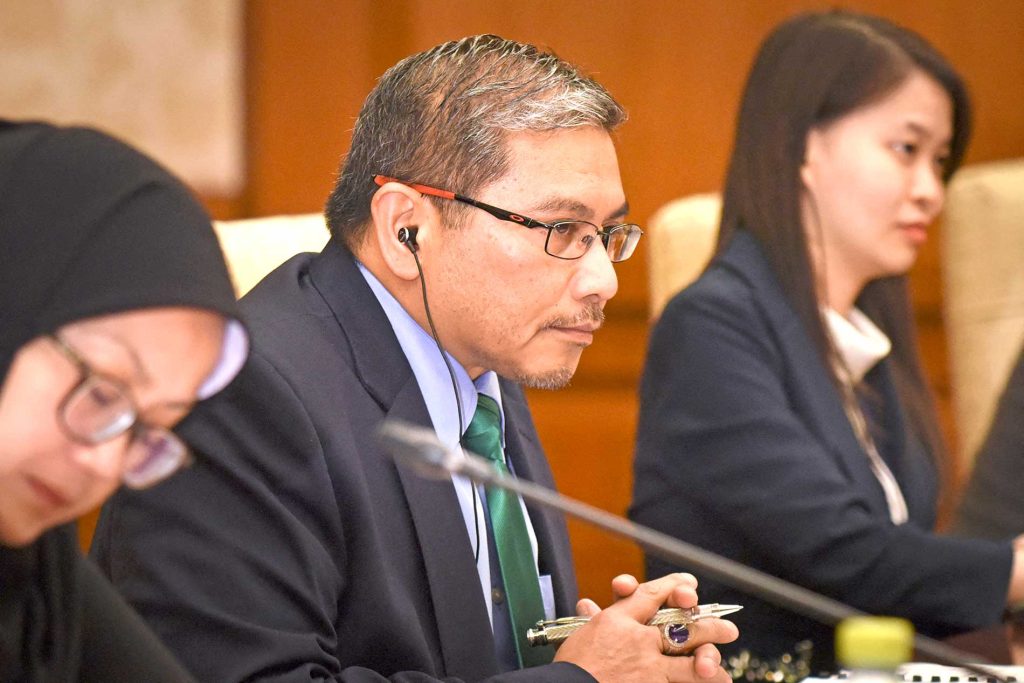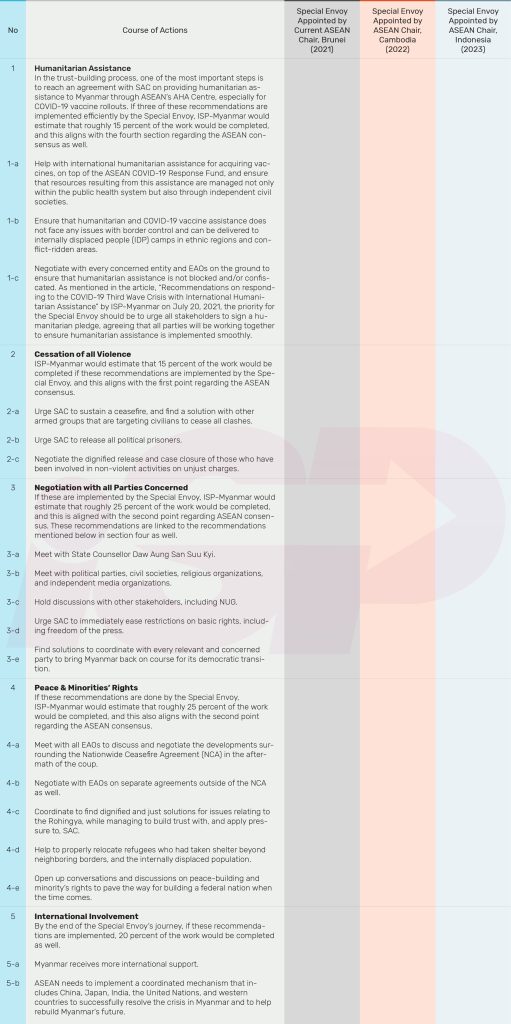(This article is an abridged translation of the original Burmese language version that Institute for Strategy and Policy -Myanmar posted on its Facebook page on August 30, 2021.)

Summary
The upcoming visit by the Association of Southeast Asian Nations (ASEAN) Special Envoy is a key political event for both the State Administration Council (SAC) and the National Unity Government (NUG) of Myanmar, but considering the short tenure of the Special Envoy (until the end of 2021) and the complicated nature of Myanmar’s political turmoil, the visit should prioritize opening a constructive dialogue between the concerned parties and building trust for the long term, rather than instigating major political changes. The aims of the visit are to negotiate with SAC for the deployment of assistance by the ASEAN Coordinating Centre for Humanitarian Assistance (AHA), a meeting with the detained State Counsellor Daw Aung San Suu Kyi during the visit, and the release of all political prisoners. Furthermore, it is also critical that this visit engages all parties concerned and facilitates the immediate cessation of any violence. In this policy article, ISP-Myanmar discusses a five-point guideline system of recommendations to counter-check the efforts of ASEAN Special Envoy in handling this crisis which has been unfolding since February 1, 2021.
Introduction
The United Nations Security Council and many powerful countries, including China, the United States, and India have accepted the approach of ASEAN in handling the current crisis in Myanmar. In April, ASEAN countries convened for a special summit dedicated to finding solutions for a crisis a member country for the first time in the last 54 years. The bloc reached a five-point consensus, calling for; 1) the immediate cessation of violence in Myanmar; 2) constructive dialogue among all parties concerned with the aim of bringing about a peaceful solution in the interests of the Burmese public; 3) mediation to be facilitated by an envoy of ASEAN’s chair, with the assistance of the Secretary-General; 4) humanitarian assistance provided by ASEAN’s AHA Centre, and 5) a visit by the Special Envoy and delegation to Myanmar to meet all parties concerned. Due to polarizing views between the ASEAN countries regarding the crisis, the bloc failed to respond to the crisis immediately and even took four months just to appoint Brunei’s second minister for foreign affairs, Erywan Yusof, as Special Envoy to Myanmar. The appointment was also met with much criticism, due to the fact that Yusof had previously referred to the coup leader as the head of the state during his visit at the end of June, prior to his appointment as the Special Envoy. Despite being the chair of ASEAN, Brunei has almost no experience in diplomatic relations with Myanmar, reaffirming distrust among those who already had no faith in the role of ASEAN. ASEAN also failed to respond to a request from the Committee Representing Pyidaungsu Hluttaw (CRPH), which is a shadow congress made up of officials elected in Myanmar’s 2020 General Election, to attend the 42nd ASEAN Assembly, but allowed a representative from SAC to attend the assembly as an observer.
Yusof will be visiting the country before the next ASEAN Summit to begin negotiations. As well as the aforementioned key actions of the visit, it is also crucial that the Special Envoy attempts to open up an inclusive discussion between political parties and ethnic armed organizations (EAOs), who are critical stakeholders that will play an important role in determining the future of Myanmar’s internal politics in the medium and long term.
There is speculation that the military regime will make some concessions during the Special Envoy visit. With another ASEAN Summit coming up at the end of this year, SAC will likely aim to make some concessions in order to gain recognition by both ASEAN and the United Nations, lessen the pressure by powerful countries, including China and allow Myanmar to benefit from COVID-19 relief implementations and vaccination programs under the SAC’s leadership. For the opposition who believe an armed revolution is the only answer, there is consternation that this visit will give further recognition to the military regime and they are hopeful this visit will not lend any further legitimacy to the SAC. For those who believe in the intertwined efforts of diplomatic and political relations, the desired outcome of this visit is to open up a dialogue between all parties concerned to ensure that the voices of the Myanmar people are heard.
Five-point Counter-check System
Though this is a critical political event for Myanmar, the complexity of the situation combined with the brevity of the Special Envoy’s term of appointment mean the focus should firmly be on establishing solid ground for future negotiations. The following recommendations and counter-check system serve as a guideline for the current ASEAN Special Envoy, the future appointed Special Envoys, as well as for ASEAN as a whole, regarding what actions should be taken in Myanmar and what preparations they can make in advance.

Conclusion
ASEAN had been unsuccessful in its previous attempt to intervene in the humanitarian crisis of Myanmar in the wake of the 2008 Nargis Cyclone. During the third wave of COVID-19 in Myanmar, the country has seen increasing humanitarian assistance by the member countries of ASEAN beyond the assistance through ASEAN’s AHA Centre. Cambodia, in particular, has been stepping up its efforts in supporting Myanmar in recent months due to its status as the incoming Chair of ASEAN (meaning Cambodia will be responsible for appointing the next Special Envoy), and possibly also because of efforts by SAC to build closer ties with Cambodia. If ASEAN wants to redeem itself to the people of Myanmar, these five-point counter-check system mentioned-above can be used as part of its strategy in finding solutions for the political crisis unfolding currently in Myanmar.
It is important to note that the five recommendations detailed in this article are not quick fixes. These are just reminders that even in the first phases of building trust, implementations still need to be considered from the long-term perspective. ASEAN’s five-point consensus can be categorized into three issues; human rights, humanitarian assistance, and conflict resolution. Addressing these three issues is undoubtedly essential, especially human rights and humanitarian assistance which should not be delayed, or even neglected somewhat, as this directly impacts the lives and livelihoods of the people. Conflict resolution is something that can only be achieved when all parties involved find a common ground when the right time comes. To get to that right time, everyone needs to work together for the better of Myanmar.
Reference:
အာဆီယံ အထူးကိုယ်စားလှယ် အလုပ်ဖြစ်ပါ့မလား [Will ASEAN Special Envoy work?]. (2021, August 06). BBC Burmese. https://www.bbc.com/burmese/burma-58108887
တရုတ်ကွန်မြူနစ်ပါတီ ဗဟိုကော်မတီက အမျိုးသားဒီမိုကရေစီအဖွဲ့ချုပ် ဗဟိုအလုပ်အမှုဆောင်ကော်မတီထံသို့ ကျေးဇူးတင်လွှာပေးပို့ [Chinese Community Party Central Committee sent appreciation letter to Central Executive Committee of National League for Democracy]. (2021, August 25). D Wave Newsletter.https://www.facebook.com/d. wave.newsletter/posts/4643618025648501
Association of Southeast Asian Nations. (n.d.). Retrieved August, 2021, from https://asean.org/ category/statements-meetings/
Bland, B. (2021, August 24). Weak and inadequate, ASEAN yet remains indispensable. Nikkei Asia. https://asia.nikkei.com/Opinion/Weak-and-inadequate-ASEAN-yet-remains-indispensable
US Department of State. (2021, August 04). Deputy Secretary Sherman’s Call with Zin Mar Aung. https://www.state.gov/deputy-secretary-shermans-call-with-zin-mar-aung/
Explained: The Tussle Over ASEAN’s Special Envoy to Myanmar. (2021, August 03). The Irrawaddy. https://www.irrawaddy.com/opinion/analysis/explained-the-tussle-over-aseans-special- envoy-to-myanmar.html
Strangio, S. (2021, August 05). Can ASEAN’s Special Envoy Resolve the Crisis in Myanmar? The Diplomat. https://thediplomat.com/2021/08/can-aseans-special-envoy-resolve-the- crisis-in-myanmar/?fbclid=IwAR1wQslksigdoVeIfIxNYF9OQ7NTfAL3WJRdL490 jYsBxsk4j4JiLigkT50
Strangio, S. (2021, August 10). New ASEAN Envoy to Myanmar Pledges to Meet With Opposition, Detained Activists. The Diplomat. https://thediplomat.com/2021/08/new-asean-envoy-to- myanmar-pledges-to-meet-with-opposition-detained-activists/?fbclid=IwAR0pv0bwaIoKG q6oGUKQ9LRZUMH2Ad6EIVxOoMZzVvQMQq_ 0YY3GiHxUfBU
Ministry of Foreign Affairs of the People’s Republic of China. (2021, August 08). Wang Yi Speaks with Special Envoy of ASEAN to Myanmar and Bruneian Second Minister of Foreign Affairs Erywan bin Pehin Yusof on the Phone. https://www.fmprc.gov.cn/mfa_eng/zxxx_662805/ t1900446.shtml

